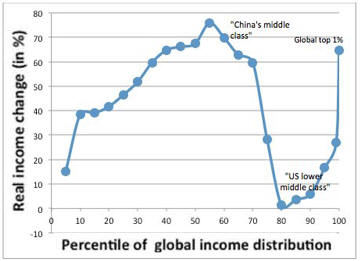|
Quick Notes by
Walter
Antoniotti Return to Political Economy Book Summaries 6/7/20 Please share! |
||||||||||||||||||||||||||
|
Prelude The Why Low Unemployment became "the" Public Policy Goal to counter Europe's post depression/recession, and Russia's latest 5 year plan.Post WW2 Pent-up Demand increased AD, increasing both US wages and Profits. But the resulting High Inflation pushed interest rates up.
The
FED broke the inflation spiral and lowered interest rates. 2. The Change
Western Business Adjusted
to a mounting profit squeeze
caused by increased flat world's AS.
But wealthy European and Asia
countries ran trade surpluses 3. The Prediction Resulting Political Turmoilwill continue but its effects may be less volatile, or maybe not. Fiscal Policy AD Increases with of infrastructure spending and or helicopter money like tax reductions could help.Government Debt
Guarantees See U.S. Post WW 2 Adjustments Part 1 Part 2 Can Democracy Survive Global Capitalism? 100 min video Political Economy Summary |
||
|
Cold War to 1980 A Full Employment Goal Created Inflationó a Debtors Paradise |
2. The Bad A Neo Liberal
Reset 1980-2008
Business Responded to Inflation by going global,
lowered wage growth and in the US, |
3. The Ugly Reactions to Neoliberalism 2008- Sustained Deflation
had Winners-Losers |
Structural Causes
|
|
|
Structural Causes 2008- Lack of Bank Regulation High Leverage Short-Term Commercial Bank Reserves Were in Euros When Dollar Reserves Were Required. Neoliberal Economist Under Estimated Economic Effects of Financial Market on Economic Activity. Government t Helped the Top and the Bottom Creating Middle Income Envy. |
|
| Economic Effects | |
| Winners | Losers |
|
Populist Nationalist Parties attracted voters with renationalization and anti-austerity policies. |
Center Left Parties
lost control as lower wages and fighting more over less, and cartel politics blamed capitalism and globalism. Center right parties in control blamed immigrants and globalism. |
|
Debtors Can't or Won't
Pay Deflation Kills Wage Growth Real Debt Value Increases |
Creditors lost as Real Value of Debt Up But Some Don't Pay |
|
World's Very Poor and Very, Very Rich Won Middle Earners of Rich Western Nations income Stagnated. |
 |
|
Bottom Line A Return on Capital Growth R > Growth rate of the Economy G.
90% of Income Gains
Went to Top 1% and since 2012,
Continued Expansion
of Credit aided by low interest rates, Trump
Could the
The_4G's of Politics, not economic inequality, |
|
Mark Blyth Summarizes 30 Years of Western Capitalism
Editor: True: Capitalism did what it was suppose to do and
protected profit from foreign competition.
Union leaders protected their jobs with tow tire wage contrects.
Science and debt did much to improve wellbeing.
Politicians, median and economists avoided change to stay in office.
A Worldwide Threat Assessment From GZERO media
As we noted in the Wednesday edition, the US intelligence community
has released its latest Worldwide Threat Assessment.
Much of the media focus this week has fallen on
President Trumpís criticism of the US intel chiefs,
but letís begin with the report itself. Here are its key findings:
The Trump administrationís trade policies have damaged US interests
by pushing allies to build new relationships with other governments.
ďAt present, China and Russia pose the greatest espionage and cyber attack threats.Ē
ISIS isnít finished.
Climate hazards
threatening infrastructure, health, and water and food security.Ē
North Korea
ďis unlikely to completely give up its nuclear weapons and production capability.Ē
North Korea has continued nuclear development in some areas
and taken actions that are reversible in others.
Iran continues to support terrorist groups in the Middle East and Europe,
but itís still complying with the terms of the nuclear
|
See
Mark Blyth explains
Crashed Video and
book-review of Crashed:
|
